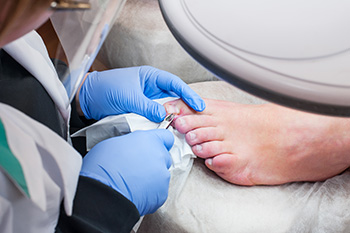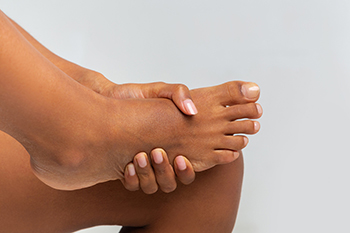Connect With Us
Blog

Foot arthritis can cause pain, stiffness, and reduced mobility, making daily activities more challenging. It often develops from wear and tear on the joints, inflammation, or conditions such as rheumatoid arthritis. Regular foot exercises can help improve flexibility, reduce discomfort, and strengthen the surrounding muscles. The plantar fascia stretch involves gently pulling the toes back to stretch the bottom of the foot, easing tension and improving movement. A calf stretch helps loosen the Achilles tendon and reduce strain on the heel. Rolling a golf ball under the foot massages the plantar fascia, promoting circulation and relieving tightness. Additionally, marble pick-ups strengthen the toes by encouraging small movements that improve coordination and flexibility. If you have arthritis that is affecting your feet, it is suggested that you consult a podiatrist who can help you find relief, and also recommend additional foot stretches.
Arthritis can be a difficult condition to live with. If you are seeking treatment, contact one of our podiatrists from Foot and Ankle Center. Our doctors can provide the care you need to keep you pain-free and on your feet.
Arthritic Foot Care
Arthritis is a joint disorder that involves the inflammation of different joints in your body, such as those in your feet. Arthritis is often caused by a degenerative joint disease and causes mild to severe pain in all affected areas. In addition to this, swelling and stiffness in the affected joints can also be a common symptom of arthritis.
In many cases, wearing ill-fitting shoes can worsen the effects and pain of arthritis. Wearing shoes that have a lower heel and extra room can help your feet feel more comfortable. In cases of rheumatoid arthritis, the arch in your foot may become problematic. Buying shoes with proper arch support that contour to your feet can help immensely.
Alleviating Arthritic Pain
- Exercises that stretch the foot can prevent further pain and injury and increase mobility
- Most of the pain can be alleviated with anti-inflammatory drugs, heat, and topical medications
- Massages can help temporarily alleviate pain.
It is best to see your doctor for the treatment that is right for your needs and symptoms. Conditions vary, and a podiatrist can help you determine the right method of care for your feet.
If you have any questions, please feel free to contact our office located in Egg Harbor Township, NJ . We offer the newest diagnostic tools and technology to treat your foot and ankle needs.

Ingrown toenail surgery is a procedure performed to relieve pain and prevent infection caused by a toenail growing into the surrounding skin. The procedure involves numbing the toe with a local anesthetic before carefully removing the affected portion of the nail. In some cases, the nail matrix is treated to prevent regrowth in the problematic area. Surgery is recommended when conservative treatments fail or when there is recurring pain, swelling, or infection. Common reasons for this condition include improper nail trimming, wearing tight footwear, and genetic predisposition. The benefits of surgery include long-term relief from pain, reduced risk of infection, and improved nail appearance. Healing typically occurs within a few weeks with proper care. If you have an ingrown toenail, it is suggested that you consult a podiatrist who can determine if this type of foot surgery is right for you.
Foot surgery is sometimes necessary to treat a foot ailment. To learn more, contact one of our podiatrists of Foot and Ankle Center. Our doctors will assist you with all of your foot and ankle needs.
When Is Surgery Necessary?
Foot and ankle surgery is generally reserved for cases in which less invasive, conservative procedures have failed to alleviate the problem. Some of the cases in which surgery may be necessary include:
- Removing foot deformities like bunions and bone spurs
- Severe arthritis that has caused bone issues
- Cosmetic reconstruction
What Types of Surgery Are There?
The type of surgery you receive will depend on the nature of the problem you have. Some of the possible surgeries include:
- Bunionectomy for painful bunions
- Surgical fusion for realignment of bones
- Neuropathy decompression surgery to treat nerve damage
Benefits of Surgery
Although surgery is usually a last resort, it can provide more complete pain relief compared to non-surgical methods and may allow you to finally resume full activity.
Surgical techniques have also become increasingly sophisticated. Techniques like endoscopic surgery allow for smaller incisions and faster recovery times.
If you have any questions please feel free to contact our office located in Egg Harbor Township, NJ . We offer the newest diagnostic and treatment technologies for all your foot and ankle needs.

The condition of your feet can provide important clues about your overall health. Cold feet may indicate poor circulation, which can be a sign of conditions like peripheral artery disease or diabetes. Persistent foot pain that does not improve with rest may suggest arthritis, nerve damage, or an underlying structural issue. Changes in the nails, including discoloration, thickening, or brittleness, can be linked to fungal infections, nutritional deficiencies, or even thyroid disorders. Additionally, burning foot pain may be a symptom of nerve damage, often associated with diabetes or vitamin B deficiency. Paying attention to these signs and seeking medical advice when necessary can help detect health issues early. If you have any type of foot pain, it is suggested that you consult a podiatrist who can treat various foot conditions, and determine if it is an indicator of additional health issues.
When dealing with systemic disease of the feet, it is extremely important to check the affected areas routinely so that any additional problems are caught quickly. If you have any concerns about your feet and ankles contact one of our podiatrists from Foot and Ankle Center. Our doctors will assist you with all of your podiatric needs.
Systemic Diseases of the Feet
Systemic diseases affect the whole body, and symptoms usually are displayed in the feet. This condition can make a patient’s ability to walk unbearable. Systemic diseases include gout, diabetes mellitus, neurological disorders, and arthritis.
Gout – is caused by an excess of uric acid in the body. Common symptoms include pain, inflammation, and redness at the metatarsal/phalangeal joint of the base big toe. Gout can be treated by NSAIDs to relieve pain and inflammation, and other drugs that lower the acid levels in the body.
Diabetes mellitus – is an increase in the level of blood sugar that the body cannot counteract with its own insulin. Failure to produce enough insulin is a factor in Diabetes.
Diabetes of the Feet
Diabetic Neuropathy – may lead to damaged nerves and affect the feet through numbness and loss of sensation.
Peripheral Vascular Disease – can restrict the blood flow to the feet, and often times lead to amputation of the feet.
If you have any questions please feel free to contact our office located in Egg Harbor Township, NJ . We offer the newest diagnostic and treatment technologies for all your foot and ankle needs.

